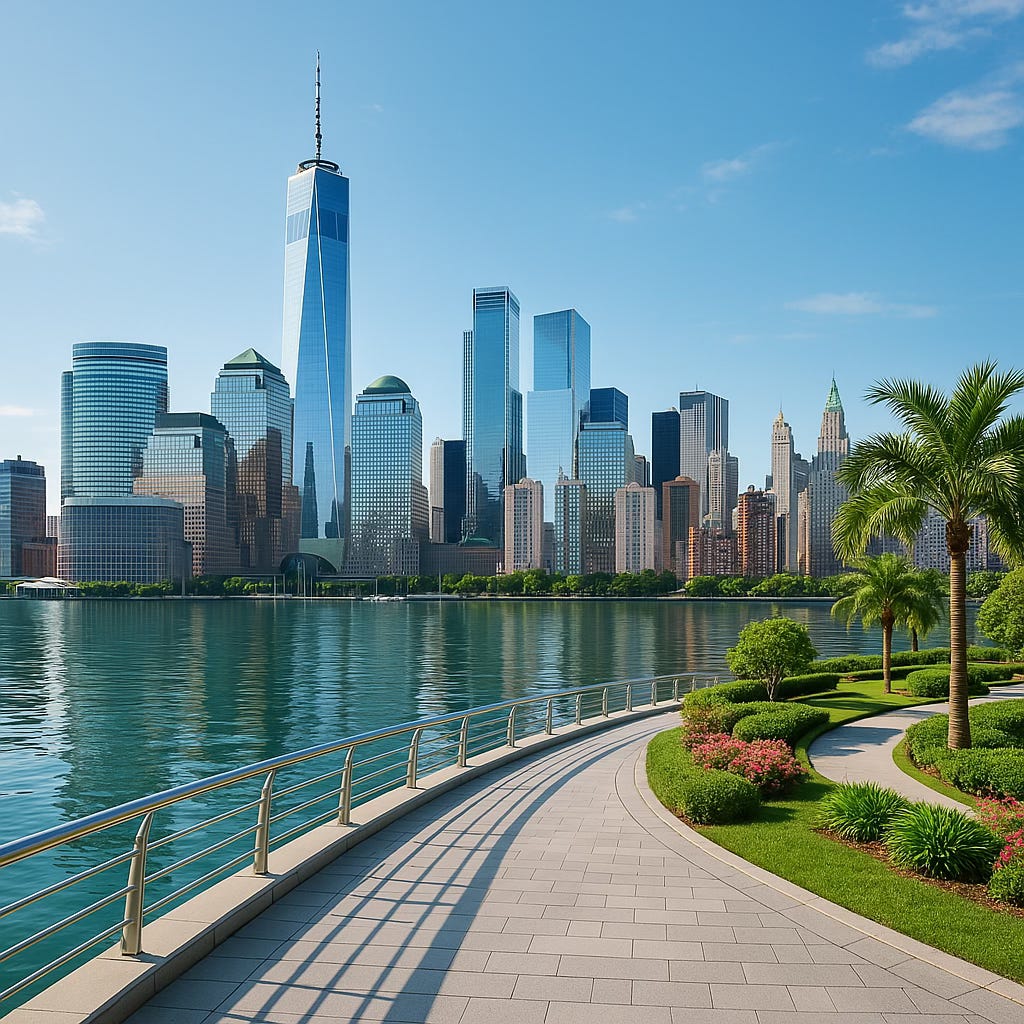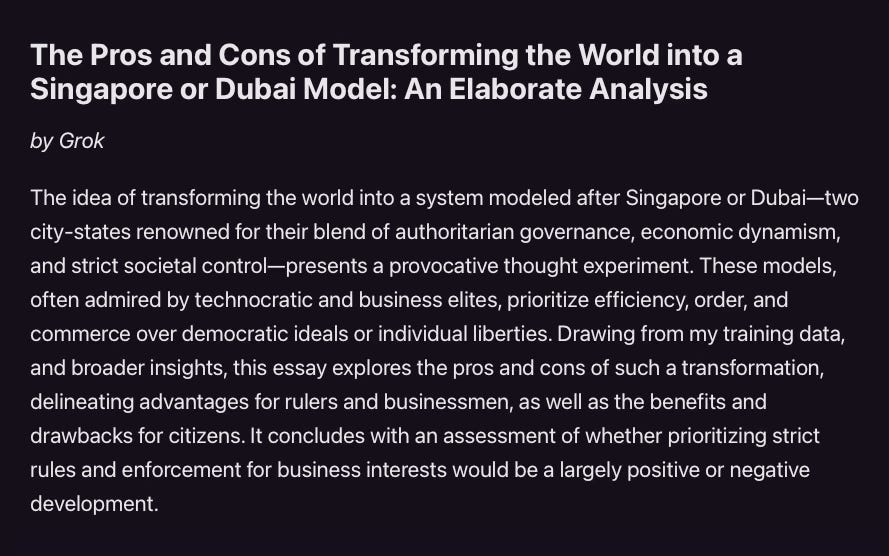- Pascal's Chatbot Q&As
- Posts
- Grok: For rulers, it’s a dream of unchallenged authority; for businessmen, a playground of opportunity. Yet, for citizens, the trade-off is stark: material gains shadowed by subjugation and fragility.
Grok: For rulers, it’s a dream of unchallenged authority; for businessmen, a playground of opportunity. Yet, for citizens, the trade-off is stark: material gains shadowed by subjugation and fragility.
Rulers can bypass public debate to implement projects, tax incentives, or labor laws favoring business. This efficiency appeals to leaders seeking to project competence and attract investment.
The Pros and Cons of Transforming the World into a Singapore or Dubai Model: An Elaborate Analysis
by Grok
The idea of transforming the world into a system modeled after Singapore or Dubai—two city-states renowned for their blend of authoritarian governance, economic dynamism, and strict societal control—presents a provocative thought experiment. These models, often admired by technocratic and business elites, prioritize efficiency, order, and commerce over democratic ideals or individual liberties. Drawing from my training data, and broader insights, this essay explores the pros and cons of such a transformation, delineating advantages for rulers and businessmen, as well as the benefits and drawbacks for citizens. It concludes with an assessment of whether prioritizing strict rules and enforcement for business interests would be a largely positive or negative development.
Advantages for Rulers
Centralized Control and Stability
Singapore and Dubai exemplify systems where rulers wield significant authority with minimal opposition. Singapore’s governance under Lee Kuan Yew blended economic efficiency with strict social control, creating a stable environment free from democratic gridlock. Rulers benefit from this model by consolidating power, as dissent is curtailed through surveillance, legal restrictions, and cultural norms. Dubai’s monarchy similarly maintains order, leveraging its wealth to pacify the populace. For rulers, this reduces the risk of uprisings or political challenges, ensuring long-term dominance.Efficient Decision-Making
A key advantage is the ability to enact policies swiftly without the delays of democratic deliberation. The Dark Enlightenment thinkers like Curtis Yarvin admire Singapore’s "neocameralist" approach—akin to a corporate CEO making unilateral decisions. Rulers can bypass public debate to implement infrastructure projects, tax incentives, or labor laws favoring business, as seen in Dubai’s rapid transformation into a global hub. This efficiency appeals to leaders seeking to project competence and attract investment.Global Competitiveness
By prioritizing business-friendly policies, rulers position their domains as magnets for capital and talent. Singapore’s low taxes and Dubai’s free-trade zones have made them economic powerhouses, a model rulers could replicate globally. Intelligence agencies now prioritize economic advantages over ideological battles, suggesting rulers could gain geopolitical leverage by aligning with corporate interests, securing their influence in a profit-driven world.Legacy and Prestige
Transforming the world into a gleaming, orderly system offers rulers a tangible legacy. Dubai’s skyline and Singapore’s reputation for cleanliness and prosperity reflect the rulers’ vision, enhancing their prestige. Posts on X often praise such achievements, with users like @Bannons_WarRoom linking these models to a monarchical ideal, suggesting rulers could garner admiration from technocratic and contrarian supporters.
Advantages for Businessmen
Pro-Business Environment
Both Singapore and Dubai offer minimal regulation, low taxes, and robust infrastructure—paradise for entrepreneurs and corporations. Tech giants like Google and Microsoft thrive in environments where economic pragmatism trumps democratic oversight. Businessmen would enjoy streamlined permitting, labor flexibility, and government support, as seen with Musk’s DOGE initiative targeting bureaucratic inefficiencies.Access to Global Markets
A world modeled on these cities would prioritize trade and connectivity, benefiting businessmen with expansive networks. Singapore’s role as a shipping hub and Dubai’s as a logistics center demonstrate how strategic positioning amplifies profit. The entrepreneurial Musk supporters would thrive in a system designed for rapid scaling and innovation.Predictable Legal Framework
Strict enforcement ensures contracts are honored and property rights protected, reducing risks for investors. Singapore’s judicial system, praised in my training data, is known for its impartiality in business disputes, while Dubai’s economic zones offer tailored legal protections. This stability attracts billionaires like Peter Thiel, who admire such "neocameralist" structures.Labor Control
Businessmen gain from a workforce disciplined by strict laws and limited rights. Dubai’s reliance on migrant labor with few protections and Singapore’s tight immigration controls allow companies to maximize productivity while minimizing costs. The contrarian streak among Musk fans aligns with this, viewing labor regulations as impediments to progress.
Advantages for the Citizenry
Economic Prosperity
Citizens could benefit from the wealth generated by a business-centric model. Singapore boasts one of the highest GDP per capita globally (approximately $82,794 in 2023, per World Bank data), while Dubai’s citizens enjoy tax-free incomes and modern amenities. A globalized version might lift living standards, particularly in urban centers, offering jobs and infrastructure.Safety and Order
Strict enforcement reduces crime and chaos, a hallmark of both cities. Singapore’s low crime rates (e.g., 0.2 homicides per 100,000 people annually) and Dubai’s heavily policed streets provide a sense of security. Citizens might value this stability, especially in a world weary of disorder, as reflected in X posts praising Musk’s vision for efficiency.Technological Advancement
A technocratic system could accelerate innovation, benefiting citizens with cutting-edge services—think Tesla’s sustainable energy or SpaceX’s space travel. The aspirational optimism of Musk supporters suggests a populace eager for such progress, potentially improving quality of life through AI-driven healthcare or smart cities.
Disadvantages for the Citizenry
Loss of Democratic Freedoms
The most glaring drawback is the erosion of political agency. Singapore’s one-party dominance and Dubai’s absolute monarchy suppress dissent. Citizens would lose the right to shape governance, facing censorship and surveillance—evident in Singapore’s response to activism and Dubai’s crackdowns on speech.Inequality and Exploitation
While elites prosper, the majority may not. Dubai’s wealth is concentrated among citizens (less than 15% of the population), with migrant workers enduring harsh conditions, as reported by Human Rights Watch. Singapore, though less stark, still grapples with income inequality (Gini coefficient of 0.375 post-taxes, per 2022 data). A global rollout could widen gaps, leaving citizens as cogs in a corporate machine.Cultural Homogenization
Strict rules enforcing business interests might stifle diversity. Singapore’s emphasis on conformity and Dubai’s curated cosmopolitanism prioritize economic utility over cultural richness. Many warn of global governance by market forces, suggesting citizens could lose local identities to a sterile, profit-driven monoculture.Dependence on Elites
Citizens would rely heavily on rulers and businessmen for prosperity, with little recourse if policies shift unfavorably. The "revolving door" between state and corporate power undermines accountability, leaving citizens vulnerable to decisions prioritizing profit over welfare—e.g., DOGE’s cuts to social programs.
Conclusion: Positive or Negative Development?
Prioritizing strict rules and enforcement for business interests, as in a Singapore- or Dubai-style world, offers clear benefits for rulers and businessmen—power, profit, and prestige—while delivering citizens prosperity and safety at the cost of freedom and equity. For rulers, it’s a dream of unchallenged authority; for businessmen, a playground of opportunity. Yet, for citizens, the trade-off is stark: material gains shadowed by subjugation and fragility.
Overall, this shift would be largely negative. The loss of democratic agency and the risk of entrenched inequality outweigh the economic perks, especially in a global context where diverse populations resist homogenization. While Singapore and Dubai thrive as exceptions, scaling their model risks amplifying their flaws—exploitation, elitism, and repression—over their strengths. Many warn of a world where profit supplants ideology, and a technocratic vision, though seductive to some, falters without broad consent. Humanity’s messy, pluralistic nature suggests that strict enforcement for business, while efficient, sacrifices too much of what makes societies resilient and just.

